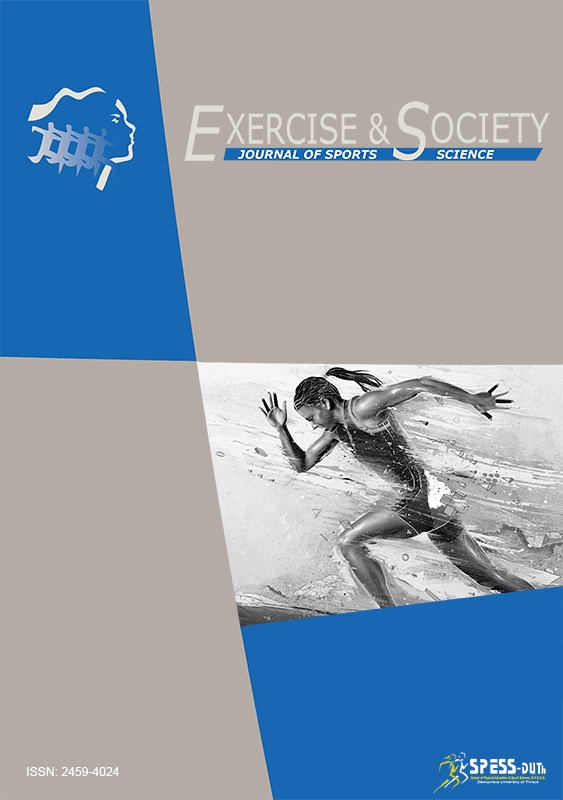Psychometric parameters of the intrinsic motivation inventory in a sample of online Physical Education students
Keywords:
intrinsic motivation, validity, reliability, students, distance learningAbstract
The aim of this study was to translate the English questionnaire of McAuley et al. (1991) on intrinsic motivation into Greek and to determine the structural validity and reliability of the Greek version. The study sample consisted of three hundred twenty-two (n=322) first-year students from the Department of Physical Education and Sport Science at Democritus University of Thrace, participating in a distance learning technology course. Pearson's correlation coefficient was used to ensure that all proposed questions were related to the structure of the 'intrinsic motivation' questionnaire. Structural validity was examined through exploratory factor analysis, and the internal consistency of the factors identified was assessed using Cronbach's alpha coefficient. The exploratory factor analysis revealed the five factors proposed by the developers (a. 'Interest-Enjoyment', b. 'Effort-Importance', c. 'Perceived Choice', d. 'Perceived Competence', e. 'Pressure-Tension'). Similarly, the internal consistency of the scale was confirmed. The results allow researchers to assert that the 'intrinsic motivation' questionnaire demonstrates the necessary structural validity, making it a reliable tool for assessing the intrinsic motivation of undergraduate Physical Education students participating in a Distance Learning course on New Technologies in Physical Education.
References
Baron, C. (2018). Surveys and scales in EDI research. In L. A. E. Booysen, R. Bendl, & J. K. Pringle (Eds.), Handbook of research methods on diversity management, equality and inclusion at work. Northampton, MA: Edward Elgar Publishing.
Deci, E. L., Eghrari, H., Patrick, B. C., & Leone, D. (1994). Facilitating internalization: The self - determination theory perspective. Journal of Personality, 62, 119-142.
Deci, E. L., & Ryan, R. M. (2000). The “What” and “Why” of Goal Pursuits: Human Needs and the Self-Determination of Behaviour. Psychological Inquiry, 11, 227-268.
Filak, V. F. & Sheldon, K. M. (2003). Student Psychological Need Satisfaction and College Teacher-Course Evaluations. Educational Psychology, 23(3), 235-247.
Fonseca, A. M., & Brito, A. P. (2001). Psychometric properties of the Portuguese version of Intrinsic Motivation Inventory (IMIp) in contexts of sports and physical activity. Análise Psicológica, 19, 59-76.
Ghergulescu, I. & Muntean, C. H. (2012). Measurement and Analysis of Learner's Motivation in Game - Based E- Learning. In D. Ifenthaler et al. (Eds.) Assessment in Game - Based Learning: Foundations, Innovations, and Perspectives, pp. 355-378.
Goudas, M., & Biddle, S. (1994). Perceived motivational climate and intrinsic motivation in school physical education classes. European Journal of Psychology of Education, 9(3), 241-250.
Goudas, M., Dermitzaki, I., & Bagiatis, K. (2000). Predictors of students’ intrinsic motivation in school physical education. European Journal of Psychology of Education, 15(3), 271- 280.
Gutiérrez, M., Ruiz, L., & López, E. (2010). Perceptions of motivational climate and teachers’ strategies to sustain discipline as predictors of intrinsic motivation in physical education. The Spanish Journal of Psychology, 13, 597-608.
McAuley E, Duncan TE, Wraith S. (1991). Self-efficacy, perceptions of success, and intrinsic motivation for exercise. Journal of Applied Social Psychology, 21, 139–155.
McAuley, E., & Tammen, V. (1989). The effects of subjective and objective competitive outcomes on intrinsic motivation. Journal of Sport and Exercise Psychology, 11, 84-93.
Oxford, R., Park-Oh, Y., Ito, S., & Sumrall, M. (1993a). Japanese by satellite: Effects of motivation, language learning styles and strategies, gender, course level, and previous language learning experience on Japanese language achievement. Foreign Language Annals, 26(3), 358-371.
Παπαδόπουλος, Δ., Δημητριάδης, Σ., Λαζαρίδης, Π., (2013). Σύγκριση κινήτρων μάθησης φοιτητών παραδοσιακής και εξ αποστάσεως τριτοβάθμιας εκπαίδευσης. Ανοικτή Εκπαίδευση: το περιοδικό για την Ανοικτή και εξ Αποστάσεως Εκπαίδευση και την Εκπαιδευτική Τεχνολογία, 9(1), 32-46.
Roberts, G. C. (2001). Understanding the dynamics of motivation in physical activity: The influence of achievement goals on motivation process. In G.C. Roberts (Ed.), Advances in motivation in sport and exercise (pp. 1-50). Champaign, IL: Human Kinetics.
Ryan, R. M., & Deci, E. L. (2000). Self-determination theory and the facilitation of intrinsic motivation, social development, and well-being. American Psychologist, 55, 68-78.
Ryan, R. M., Mims, V., & Koestner, R. (1983). Relation of reward contingency and interpersonal context to intrinsic motivation: A review and test using cognitive evaluation theory. Journal of Personality and Social Psychology, 45, 736-750.
Tabachnick, B. G. & Fidell, L. S. (2019). Using multivariate statistics (7th ed.). Boston, MA: Pearson.
Tsitskari, E., & Kouli, O. (2010). Intrinsic motivation, perception of sport competence, and life-satisfaction of children in a Greek summer sport camp. World Leisure Journal, 52, 279-289.
Vos, N., van der Meijden, H., & Denessen, E. (2011). Effects of constructing versus playing an educational game on student motivation and deep learning strategy use. Computers & Education, 56(1), 127-137.
Zalaquett, C. P. & Wood, R. J. (1997). Evaluating Stress. A Book of Resources. London: The Scarecrow Press.
Downloads
Published
How to Cite
Issue
Section
License
Authors who publish with this journal agree to the following terms:
a. Authors retain copyright and grant the journal right of first publication with the work simultaneously licensed under a Creative Commons Attribution License that allows others to share the work with an acknowledgement of the work's authorship and initial publication in this journal.
b. Authors are able to enter into separate, additional contractual arrangements for the non-exclusive distribution of the journal's published version of the work (e.g., post it to an institutional repository or publish it in a book), with an acknowledgement of its initial publication in this journal.
c. Authors are permitted and encouraged to post their work online (e.g., in institutional repositories or on their website) prior to and during the submission process, as it can lead to productive exchanges, as well as earlier and greater citation of published work (See The Effect of Open Access).


